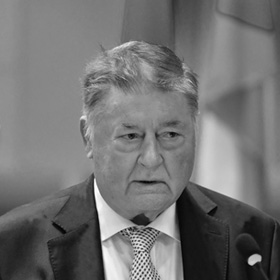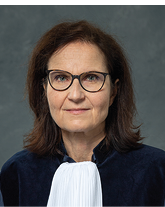A | The Court of Justice in 2024
The Court of Justice deals mainly with requests for a preliminary ruling. When a national court is uncertain as to the interpretation or validity of an EU rule, it stays the proceedings before it and refers the matter to the Court of Justice. When the matter has been clarified by the Court of Justice’s decision, the national court is then in a position to settle the dispute before it. In cases calling for a response within a very short time (for example, in relation to asylum, border control, child abduction, and so forth), an urgent preliminary ruling procedure may be used.
The Court also deals with direct actions, which seek either the annulment of an EU act (‘action for annulment’) or a declaration that a Member State is failing to comply with EU law (‘action for failure to fulfil obligations’). If the Member State does not comply with the judgment finding that it has failed to fulfil its obligations, a second action, known as an action for ‘twofold failure to fulfil obligations’, may result in the Court of Justice imposing a financial penalty on it.
Furthermore, appeals may be brought against decisions handed down by the General Court. The Court of Justice may set aside such decisions of the General Court.
Lastly, requests for an opinion may be made to the Court of Justice to determine the compatibility with the Treaties of an agreement which the European Union envisages concluding with a non‑member State or an international organisation (submitted by a Member State or by a European institution).
Activities and developments at the Court of Justice

Koen Lenaerts
President of the Court of Justice of the European Union
The past year was marked by the adoption and the implementation of the legislative reform of the judicial architecture of the European Union by European Parliament and Council Regulation 2024/2019, which seeks, at the request of the Court of Justice, to balance the litigation workload between the two courts of the European Union by taking advantage of the doubling of the number of judges at the General Court resolved upon in European Parliament and Council Regulation 2015/2422 in 2015. The Court of Justice should thus be in a position to continue to perform, within reasonable time limits, its task of interpreting EU law even though it is experiencing a significant increase in the litigation brought before it and a rise in the number of complex and sensitive cases concerning, in particular, constitutional questions or matters related to fundamental rights. For instance, in 2024, over 900 new cases were brought before the Court of Justice, a figure close to the 2019 record, which confirms the upwards trend observed in recent years and underlines the need for this reform.
More specifically, the reform essentially saw a partial transfer of jurisdiction to give preliminary rulings from the Court of Justice to the General Court. That transfer, which has been effective since 1 October 2024, covers six specific areas, namely the common system of value added tax, excise duties, the Customs Code, the tariff classification of goods under the Combined Nomenclature, compensation and assistance of passengers in the event of denied boarding or of delay or cancellation of transport services and the system for greenhouse gas emission allowance trading.
However, the Court of Justice retains jurisdiction to hear and determine requests for a preliminary ruling which, although they fall within one or more of those specific areas, also concern other matters or raise separate questions concerned with the interpretation of primary law (including the Charter of Fundamental Rights of the European Union), public international law or general principles of EU law.
The reform is expected to result in a significant reduction in the workload of the Court of Justice in connection with preliminary rulings, which appears to be confirmed by the initial estimates covering the final three months of the past year.
The goal of a further strand of the reform is to preserve the effectiveness of the procedure for appeal against decisions of the General Court. In order to allow the Court of Justice to focus on appeals raising significant questions of law, the mechanism used to determine whether appeals are allowed to proceed has been expanded, since 1 September 2024, to include decisions of the General Court relating to the decisions of six new independent boards of appeal of European bodies, offices and agencies, which have been added to the four boards of appeal initially earmarked when that mechanism was introduced. In addition, the mechanism has also been extended to cover disputes relating to the performance of contracts containing an arbitration clause.
Finally, the aim of the reform is to strengthen the transparency of the preliminary ruling procedure and, in so doing, to provide a better understanding of the decisions handed down by the Court of Justice or the General Court. From now on, written observations lodged in preliminary rulings will be published on the Institution’s website, within a reasonable time after the case has closed, unless the author of those observations objects to their publication.
Alongside the amendment of the Statute of the Court of Justice of the European Union, implementation of the reform has resulted in amendments to the Rules of Procedure of the Court of Justice and the Rules of Procedure of the General Court in order, inter alia, to clarify the arrangements for the initial handling of requests for a preliminary ruling submitted under the ‘one‑stop shop’ principle and the procedure applicable to requests transmitted to the General Court by the Court of Justice. Furthermore, the Rules of Procedure of the General Court also contain other new provisions which seek to learn lessons from the health crisis and technological developments, in particular as regards the option of the parties or their representatives addressing the General Court by videoconference, subject to compliance with specific legal and technical requirements, the protection of personal data when dealing with cases, the arrangements for lodging and serving procedural documents via the e‑Curia application and the broadcasting of certain hearings on the internet.
The Recommendations to national courts and tribunals in relation to the initiation of preliminary ruling procedures and the Practice Directions to parties have likewise been amended accordingly.
Turning to the composition of the Institution, in June 2024, we mourned the death of Mr Ilešič (Slovenia), who had served as a judge at the Court of Justice since 2004.
The past year also saw Judge Safjan (Poland) take a leave of absence in January 2024, before a partial and very significant replacement of Judges at the Court of Justice in October, with the departure from office of eight Members: Vice‑President Bay Larsen (Denmark), Judge Bonichot (France), Judge Prechal (Netherlands), Judge Xuereb (Malta), Judge Rossi (Italy), Judge Wahl (Sweden) and Advocates General Pikamäe (Estonia) and Collins (Ireland), and the entry into office of nine new Members: Judge Smulders (Netherlands), Advocate General Spielmann (Luxembourg), Judges Condinanzi (Italy) and Schalin (Sweden), Advocate General Biondi (Italy), Judges Gervasoni (France) and Fenger (Denmark), Judge Frendo (Malta) and Advocate General Norkus (Lithuania).
The statistics for the past year reveal that a very high number of cases were brought before the Court (920, almost 100 more than in each of the last three years) and closed by it (863 cases, 80 more than in the previous year); the latter figure is due in large part to the constraints associated with the partial replacement of the Judges at the Court. There were thus 1 206 pending cases as of 31 December 2024. The average duration of proceedings, all manner of cases combined, stood at 17.7 months in 2024.

Members of the Court of Justice
The Court of Justice is composed of 27 Judges and 11 Advocates General.
The Judges and Advocates General are appointed by common accord of the governments of the Member States after consultation with a panel responsible for providing an opinion on prospective candidates’ suitability to perform the duties concerned. Judges are appointed for a term of office of six years, which is renewable.
They are chosen from among individuals whose independence is beyond doubt and who possess the qualifications required for appointment, in their respective countries, to the highest judicial offices, or who are of recognised competence.
The Judges perform their duties in a totally impartial and independent manner.
The Judges of the Court of Justice appoint, from amongst themselves, the President and Vice‑President. The Judges and Advocates General appoint the Registrar for a term of office of six years.
The Advocates General are responsible for delivering, with complete impartiality and independence, an ‘opinion’ in the cases assigned to them. This opinion is not binding, but allows for an additional view to be provided on the subject matter of the dispute.
The partial replacement of Judges at the Court of Justice in October 2024 saw the entry into office of nine new Members: Judge Smulders (Netherlands), Advocate General Spielmann (Luxembourg), Judges Condinanzi (Italy) and Schalin (Sweden), Advocate General Biondi (Italy), Judges Gervasoni (France) and Fenger (Denmark), Judge Frendo (Malta) and Advocate General Norkus (Lithuania).

In memoriam
The Slovenian Judge Marko Ilešič died in June 2024, at which time he was a serving Member of the Court. He was the first Slovenian Member appointed to the Court on Slovenia’s accession to the European Union in 2004. Respected and admired, both professionally and personally, for his legal expertise, intellect and extensive language skills, as well as for his great humanity, Mr Ilešič made a major contribution to the development and promotion of EU law and enhanced the reputation of Slovenian culture.

K. Lenaerts

T. von Danwitz

F. Biltgen

K. Jürimäe

C. Lycourgos

I. Jarukaitis

M.L. Arastey Sahún

M. Szpunar

S. Rodin

A. Kumin

N. Jääskinen

D. Gratsias

M. Gavalec

J. Kokott

A. Arabadjiev

M. Campos Sánchez‑Bordona

E. Regan

N.J. Cardoso da Silva Piçarra

J. Richard de la Tour

A. Rantos

I. Ziemele

J. Passer

N. Emiliou

Z. Csehi

O. Spineanu‑Matei

T. Ćapeta

L. Medina

B. Smulders

D. Spielmann

M. Condinanzi

F. Schalin

A. Biondi

S. Gervasoni

N. Fenger

R. Frendo

R. Norkus

A. Calot Escobar
Order of Precedence as from 9 October 2024
B | The General Court in 2024
Proceedings may primarily be brought before the General Court, at first instance, in direct actions brought by natural or legal persons (individuals, companies, associations, and so forth), where they are directly and individually concerned, and by Member States against acts of the institutions, bodies, offices or agencies of the European Union, and in direct actions seeking compensation for damage caused by the institutions or their staff.
The decisions of the General Court may be the subject of an appeal, limited to points of law, before the Court of Justice. In cases which have already been considered twice (by an independent board of appeal and then by the General Court), the Court of Justice will allow an appeal to proceed only if it raises an issue that is significant with respect to the unity, consistency or development of EU law.
Since 1 October 2024, the General Court has also had jurisdiction to hear and determine requests for a preliminary ruling, transferred by the Court of Justice, which fall exclusively into one or more of the following six specific areas: the common system of value added tax; excise duties; the Customs Code; the tariff classification of goods under the Combined Nomenclature; compensation and assistance of passengers in the case of denied boarding or of delay or cancellation of transport services; the system for greenhouse gas emission allowance trading.
A large part of the litigation before it is economic in nature: intellectual property (EU trade marks and designs), competition, State aid, and banking and financial supervision. The General Court also has jurisdiction to adjudicate in civil service disputes between the European Union and its staff.
Activities and developments at the General Court

Marc van der Woude
President of the General Court of the European Union
2024 was a particularly significant year for the General Court as it saw the entry into force of Regulation 2024/2019, which reformed the judicial architecture of the European Union. The partial transfer of jurisdiction to give preliminary rulings from the Court of Justice to the General Court thus took effect on 1 October 2024.
Pursuant to the Statute of the Court of Justice of the European Union, the General Court now has jurisdiction to hear and determine requests for a preliminary ruling which fall exclusively within one or more of the following six specific areas: the common system of VAT, excise duties, the Customs Code, the tariff classification of goods, compensation and assistance to passengers in the event of denied boarding or of delay or cancellation of transport services, and the system for greenhouse gas emission allowance trading (new Article 50b). 19 requests for a preliminary ruling lodged between 1 October and 31 December 2024 were the subject of a transfer decision.
Internally, the General Court had to reorganise its structure by appointing ten judges sitting in the chamber designated to deal with requests for a preliminary ruling, as well as the President of that chamber, Mr Papasavvas, Vice‑President of the General Court. To ensure optimum handling of requests for a preliminary ruling, the General Court also appointed three judges to perform the duties of Advocates General. In addition, its Rules of Procedure now provide for the possibility of rulings being given, in particular in certain preliminary ruling cases, in an intermediate chamber composed of nine judges.
Similarly, from 1 September 2024, provision was made to extend the mechanism to determine whether appeals against decisions of the General Court concerning a decision of an independent board of appeal of one of the bodies, offices or agencies of the European Union are allowed to proceed (new Article 58a of the Statute of the Court, also inserted by Regulation 2024/2019). This strand of the reform also places greater responsibility on the General Court to ensure the consistency and the uniformity of the law in the fields of law concerned.
The reform coincided with the departure, on 7 October 2024, of five Members of the General Court, who were appointed Judges at the Court of Justice. Judge Gervasoni, Presidents of the Chamber Spielmann and Schalin, Judge Frendo and Judge Norkus thus left the General Court. The General Court thanks them for their long and important contribution to its case‑law. On that same date, Judges Cassagnabère and Meyer took the oath as new Members of the General Court.
That major reorganisation and the departures of Members did not, however, slow down the pace of judicial activities at the General Court, which was able to close 922 cases over the course of 2024. Since only 786 cases were brought during that same year, the number of cases pending was thus reduced. The average duration of proceedings of 18.5 months demonstrates that cases are being managed effectively, bearing in mind that the General Court is able to react even more speedily where the particular circumstances of the case so require. For instance, it was able to give its first judgment in the field of digital markets in 8.2 months (judgment in Bytedance v Commission, T‑1077/23).
In 2024, 20.2% of the cases closed were closed by chambers sitting in extended composition. In addition, the General Court is continuing its approach of ruling in cases of particular importance to, in particular, the rule of law sitting as a Grand Chamber, composed of 15 judges (see Chapter entitled ‘A look back at major judgments of the year’). It was sitting as a Grand Chamber that the General Court gave judgment in the cases of Ordre néerlandais des avocats du barreau de Bruxelles and Others v Council, Medel and Others v Council, Fridman and Others v Council and Timchenko and Timchenko v Council.
In the light of its new jurisdiction in preliminary rulings, as well as its new responsibilities following the extension of the mechanism to determine whether appeals are allowed to proceed, the General Court has equipped itself with all the tools necessary to deal effectively and proactively with the cases brought before it, whilst preparing for the upcoming three‑year period beginning in October 2025.

Innovations in case‑law

Savvas Papasavvas
Vice‑President of the General Court
2024 marked the return to centre stage of the Grand Chamber, the highest‑ranking formation of the General Court, from which, to date, rulings have been sought only rarely and intermittently. Composed of fifteen judges, the Grand Chamber hears and determines the most important cases as well as those which present a legal difficulty or are characterised by special circumstances (Article 28(1) of the Rules of Procedure of the General Court). Six decisions bringing together a number of cases have thus been given by the Grand Chamber in the course of the past year against the backdrop of, on the one hand, Russian aggressions against Ukraine and, on the other hand, the implementation of the Recovery and Resilience Facility as part of the NextGenerationEU recovery plan.
First, in its judgments of 11 September 2024, Fridman and Others v Council and Timchenko and Timchenko v Council (T‑635/22 and T‑644/22), the General Court confirmed the Council’s power, first, to impose obligations on persons subject to restrictive measures to report funds and to cooperate with the competent national authorities and, second, to treat the failure to comply with those obligations as a circumvention of fund‑freezing measures.
Next, in its judgments of 2 October 2024, Ordre néerlandais des avocats du barreau de Bruxelles and Others v Council, Ordre des avocats à la cour de Paris and Couturier v Council and ACE v Council (T‑797/22, T‑798/22 and T‑828/22), the General Court confirmed the legality of the prohibition on providing, directly or indirectly, legal advisory services to the Russian Government and to legal persons, entities and bodies established in Russia (Council Regulation No 833/2014 concerning restrictive measures in view of Russia’s actions destabilising the situation in Ukraine). The cases dealt with the question of whether there is a fundamental right of access to a lawyer, specifically in situations which have no link with judicial proceedings. The General Court dismissed the actions, but took care, inter alia, to clarify the scope of both the right to an effective remedy (Article 47 of the Charter of Fundamental Rights of the European Union) and the right to professional secrecy (Article 7).
Finally, by an order of 4 June 2024, Medel and Others v Council (T‑530/22 to T‑533/22), the General Court dismissed the applications for annulment of the implementing decision by which the Council approved the assessment of Poland’s recovery and resilience plan and specified the milestones and targets which that Member State must achieve in order for the financial contribution made available to it in the contested decision to be granted. The Grand Chamber took the view that the applicants, four associations representing judges at international level whose members were, as a general rule, national professional associations, including Polish associations, could not rely on their standing to bring proceedings.
This fresh impetus given to the Grand Chamber is set to continue in 2025, as other cases are currently pending before it. This will probably be accompanied by references to the intermediate chamber, established by Regulation 2024/2019 to supplement the arsenal of high‑ranking chambers at the General Court’s disposal.

Members of the General Court
The General Court is composed of two Judges from each Member State.
The Judges are chosen from among individuals whose independence is beyond doubt and who possess the qualifications required for appointment to the highest judicial offices. They are appointed by common accord of the governments of the Member States after consultation with a panel responsible for giving an opinion on candidates’ suitability. They are appointed for a term of office of six years, which is renewable. They appoint, from amongst themselves, the President and Vice-President for a period of three years, and appoint the Registrar for a term of office of six years.
The Judges perform their duties in a totally impartial and independent manner.
Against the backdrop of the partial transfer, from 1 October 2024, of jurisdiction to give preliminary rulings from the Court of Justice to the General Court, the General Court elected Mr Martín y Pérez de Nanclares and Ms Brkan as Judges called upon to perform the duties of Advocates General in connection with the handling of requests for a preliminary ruling, and Mr Gâlea as an alternate should they be prevented from attending.

M. van der Woude

S. Papasavvas

A. Marcoulli

R. da Silva Passos

J. Svenningsen

M.J. Costeira

K. Kowalik‑Bańczyk

A. Kornezov

L. Truchot

O. Porchia

R. Mastroianni

P. Škvařilová‑Pelzl

M. Jaeger

H. Kanninen

J. Schwarcz

M. Kancheva

E. Buttigieg

V. Tomljenović

L. Madise

N. Półtorak

I. Reine

P. Nihoul

U. Öberg

C. Mac Eochaidh

G. De Baere

T. Pynnä

J.C. Laitenberger

J. Martín y Pérez de Nanclares

G. Hesse

M. Sampol Pucurull

M. Stancu

I. Nõmm

G. Steinfatt

T. Perišin

D. Petrlík

M. Brkan

P. Zilgalvis

K. Kecsmár

I. Gâlea

I. Dimitrakopoulos

D. Kukovec

S. Kingston

T. Tóth

B. Ricziová

E. Tichy‑Fisslberger

W. Valasidis

S. Verschuur

S.L. Kalėda

L. Spangsberg Grønfeldt

H. Cassagnabère

R. Meyer

V. Di Bucci
Order of Precedence as from 9 October 2024
C | Case‑law in 2024
- Focus 2020 Mobility Package: fair competition and improvement of working conditions for a safer, more sustainable and fairer road sector
- Focus Organic production and labelling of organic products
- Focus Public access to the purchase agreements for COVID‑19 vaccines
- Focus Restrictive measures adopted in respect of actions undermining or threatening the territorial integrity, sovereignty and independence of Ukraine
- A look back at major judgments of the year

Focus
2020 Mobility Package: fair competition and improvement of working conditions for a safer, more sustainable and fairer road sector
Judgment in Lithuania and Others v Parliament and Council of 4 October 2024 (C‑541/20 to C‑555/20)
2020 Mobility Package
In 2020, a series of reforms was adopted by the European Union in the road transport sector with two main goals:
1. Improving drivers’ working conditions:
-
– by prohibiting the weekly rest period from being taken in vehicles;
– by guaranteeing regular returns to their place of residence or the operational centre (every three or four weeks) so that they can spend their rest period there;
– by bringing forward the date of entry into force of the obligation to install second‑generation intelligent tachographs.
2. Establishing fair competition:
-
– by requiring vehicles to return to an operational centre situated in the Member State of establishment of the transport undertaking every eight weeks;
– by introducing a four‑day waiting period after a cabotage cycle carried out in a host Member State (during which non‑resident hauliers are not allowed to carry out cabotage operations with the same vehicle in that Member State);
– by classifying drivers as ‘posted workers’ in certain specific cases, so that they benefit from the terms and conditions of employment and remuneration in force in the host Member State.
A cabotage operation is transport carried out within a Member State by a haulier not established in that Member State. Such transport is allowed as long as it is not carried out in a way that creates a permanent activity in that Member State.
A second-generation intelligent tachograph is an electronic device which records drivers’ driving times, breaks and rest periods. It helps to ensure road safety, guarantee compliance with drivers’ working conditions and prevent fraud.
The Mobility Package consists of three legislative acts concerning the legal rules governing road transport. This ambitious reform prompted fierce debate, resulting in a series of legal actions. Thus, seven Member States – Lithuania, Bulgaria, Romania, Cyprus, Hungary, Malta and Poland – brought before the Court of Justice fifteen actions for annulment of certain provisions of the Mobility Package.
The Court’s judgment broadly confirmed the validity of the Mobility Package.
Whilst acknowledging that improving drivers’ working conditions may result in an increase in the costs borne by transport undertakings, the Court observed that those rules, which apply without distinction throughout the European Union, do not discriminate against transport undertakings established in Member States situated ‘on the periphery of the Union’. If those rules have a greater impact on certain undertakings, that is because they made an economic choice to provide their services to recipients situated in Member States distant from their own place of establishment.
As for the classification as ‘posted workers’ (which allows drivers to benefit from the minimum terms and conditions of employment and remuneration in the host Member State, rather than those potentially less favourable terms and conditions in the State of establishment of the transport undertaking), this is a measure intended to guarantee fair working conditions and to combat unfair competitive practices. This development, although it is beneficial to employees, prompted debate amongst Member States, some of which, in particular low‑wage States, feared an increase in costs for their undertakings and the administrative complexity of the new rules. The Court backed this measure, which was adopted by the EU legislature with the aim of striking a fair balance between the various interests involved.
As regards the obligation to comply with a four‑day waiting period after a cabotage cycle carried out in a host Member State, the Court pointed out that the purpose of that period is to protect local undertakings and prevent unfair competition, by stopping repeated cabotage operations from ultimately constituting de facto permanent activity in the host Member State. Some Member States contested that obligation, claiming that it restricts undertakings’ flexibility by forcing them to adjust their itineraries to avoid periods of downtime that result in lost revenue. The Court rejected those arguments, observing that the measure simply prohibits cabotage operations in the same Member State during the waiting period, which does not prevent other international transport or cabotage operations from being carried out in other Member States.
The Court did, however, annul the obligation requiring vehicles to return to the transport undertaking’s operational centre every eight weeks. It held that the Parliament and the Council had not established that they had sufficient information to assess the proportionality of that measure and its social, environmental and economic impacts.

Focus
Organic production and labelling of organic products
Judgment in Herbaria Kräuterparadies II (C‑240/23)
The German company Herbaria manufactures the beverage ‘Blutquick’, which is marketed as a food supplement. That beverage contains organically produced ingredients, as well as added non‑plant vitamins and ferrous gluconate. Its packaging bears the European Union organic production logo and a reference to ‘controlled organic agriculture’.
In January 2012, the German authorities had prohibited Herbaria from referring to protected organic production because EU law allows vitamins and minerals to be added to processed produce bearing the term ‘organic’ only if their use is legally required.
The Court of Justice, in response to a reference for a preliminary ruling made in an initial case (Case C‑137/13), had held that the use of such substances is deemed to be legally required only if a rule of EU law or a compatible national rule directly requires that those substances be added to a foodstuff in order for that foodstuff to be placed on the market. Since the vitamins and ferrous gluconate added to ‘Blutquick’ did not satisfy that requirement, Herbaria’s action was dismissed by the German court which had referred the matter to the Court of Justice.
The case was subsequently referred to the German Federal Administrative Court, before which Herbaria no longer contested the prohibition on displaying the European Union organic production logo but rather alleged that there was unequal treatment between its product and a similar product imported from the United States.
The United States are recognised under European law as a third country whose production and control rules are equivalent to those of the European Union. According to Herbaria, this means that products from the United States that comply with US production rules can be marketed in the European Union as organic products. The company claims that that situation gives rise to unequal treatment, as the rival American products can bear the European Union organic production logo without complying with the organic production rules applicable in relation to it.
The German Federal Administrative Court put questions to the Court of Justice in this regard.
In its judgment, the Court took the view that only products compliant with all the requirements laid down in the Regulation on organic production and labelling of organic products can use the European Union organic logo. That logo cannot therefore be used for products manufactured in a third country according to rules merely equivalent to those provided for in EU law. That prohibition extends to the use of terms referring to such production.
The Court observes that allowing the use of that logo and such terms both for products – whether manufactured in the European Union or in third countries – compliant with the European organic production standards and for products manufactured in third countries according to standards merely equivalent to European organic production standards would risk harming fair competition within the internal market. This could also mislead consumers, even though the very purpose of the logo is to inform consumers, in a clear and unambiguous manner, that the product is fully compliant with the requirements laid down in that regulation.
However, the Court did hold that the organic production logo of a third country may be used for products manufactured in that country, even where it contains terms referring to organic production.

The European Union organic logo
The European Union organic logo gives a coherent visual identity to organic products produced in the European Union. This makes it easier for consumers to identify organic products and helps farmers to market them in all the Member States.
The organic logo can only be used on products that have been certified as organic by an authorised body, thereby ensuring compliance with the strict conditions on how they must be produced, processed, transported and stored. The organic logo can also only be used on products which contain at least 95% organic ingredients, and only if the remaining 5% fulfil strict conditions. The same ingredient cannot be present in organic and non‑organic form.
Regulation 2018/848
Regulation 2018/48 on organic production and labelling of organic products aims to ensure fair competition, the proper functioning of the internal market in that sector and consumer confidence in products labelled as organic.
It establishes general and detailed production rules. In relation to labelling, it requires that products comply with the rules on the provision of information to consumers, specifically to avoid any confusion or deception. It also lays down specific provisions relating to the labelling of organic and in‑conversion products to protect both the interests of operators – who want their products to be correctly identified and to enjoy fair market conditions – and those of consumers.
Other judgments of the Court of Justice concerning organic products
Judgment in Kamin und Grill Shop of 12 October 2017 (C‑289/16)
Under Regulation No 834/2007 on organic production and labelling of organic products, an operator marketing organic products is required to submit his, her or its undertaking to a control system. Operators who sell products directly to the final consumer or user may be exempted from that obligation subject to certain conditions. The Court of Justice held that the sale must occur in the presence of both the operator or his, her or its sales personnel and the final consumer. Therefore, operators marketing such products online cannot qualify for that exemption.
Judgment in Œuvre d’assistance aux bêtes d’abattoirs of 26 February 2019 (C‑497/17)
Regulation No 834/2007 does not allow the European Union organic logo to be placed on products derived from animals which have been slaughtered in accordance with religious rites without first being stunned, a process performed subject to the conditions laid down in Regulation No 1099/2009 on the protection of animals at the time of killing.
Judgment in Natumi of 29 April 2021 (C‑815/19)
Regulation No 889/2008 laying down detailed rules for the implementation of Regulation No 834/2007 precludes the use of a powder obtained from the cleaned, dried and ground sediment of the alga Lithothamnium calcareum, as a non‑organic ingredient of agricultural origin, in the processing of organic foodstuffs (inter alia rice- and soya‑based organic drinks) for the purpose of their enrichment with calcium.

Focus
Public access to the purchase agreements for COVID‑19 vaccines
Judgments in Auken and Others v Commission and Courtois and Others v Commission (T‑689/21 and T‑761/21)
In June 2020, the European Union launched its strategy to acquire COVID-19 vaccines. In that context, the Commission signed an agreement with the 27 Member States, authorising the Commission to conclude in their name advance purchase agreements with manufacturers.
Since it was in the interest of public health for vaccines to be deployed early, the period for the development of the vaccines by the pharmaceutical undertakings was shortened. To compensate for the risks incurred by those undertakings, the Commission and the Member States incorporated the principle of risk sharing between the manufacturer and the Member States into their vaccination strategy, thereby reducing the manufacturer’s liability should adverse reactions arise from the use of its product.
The versions of the contracts that were made public were redacted, removing information about the financial risks, donations and resales, as well as the declarations that there were no conflicts of interest.
In 2021, citizens and MEPs contested the European Commission’s partial refusal to provide full access to certain documents connected with the 2020 vaccine purchase agreements. The access requests concerned indemnification clauses for the pharmaceutical undertakings. Under those clauses, laboratories were required to compensate victims in cases of wilful misconduct or serious negligence during manufacturing, whereas, in other cases, such liability rested with the Member States.
The citizens and MEPs also sought access to the declarations that there were no conflicts of interest on the part of the members of the team which negotiated the purchase of the vaccines. They wanted to shed light on how the negotiations had been conducted, particularly in relation to a mega-contract concluded in May 2021 for the purchase of 1.8 billion additional doses of vaccine worth EUR 35 billion.
The Commission had granted only partial access to those documents and had published redacted versions of them, relying on the confidentiality of business practices and the protection of privacy.
Further to two actions brought before it challenging the Commission’s decisions, the General Court annulled those decisions in part.
With regard to the request for wider access to the indemnification clauses, the General Court observed that the reason for their inclusion in the contracts – namely, to offset the risks incurred by the pharmaceutical undertakings in connection with the shortening of the period for the development of the vaccines – had been endorsed by the Member States and was in the public domain. It held that the Commission had not demonstrated how wider access to those clauses, to certain definitions contained in the contracts (such as definitions of ‘wilful misconduct’ and ‘best reasonable efforts’) and to the provisions on donations and resales of the vaccines would actually undermine the commercial interests of the pharmaceutical undertakings concerned.
As for the request relating to the disclosure – in the declarations that there were no conflicts of interest – of the identity of the members of the negotiating team, the General Court confirmed that that request had a public interest purpose. Only by disclosing their identities is it possible to ascertain whether the members of the negotiating team had no conflicts of interest. In addition, such transparency in the contract negotiation process strengthens EU citizens’ trust in the Commission’s vaccination strategy and helps to combat the dissemination of false information. The General Court thus held that the Commission had not correctly weighed up the interests at issue, that is, the absence of any conflict of interest and the risk that the right of privacy might be infringed.
Public access to documents: a key element of transparency
The purpose of Regulation No 1049/2001 of the European Parliament and of the Council is to grant the public the widest possible access to European Parliament, Council and Commission documents. It seeks to strengthen the transparency, legitimacy and accountability of the Institutions.
However, that right is not absolute. Provision is made for exceptions in order to protect certain public or private interests, such as public security, the confidentiality of internal deliberations and legal advice, financial, economic or commercial interests, or even the protection of personal data.
The Institutions have to reconcile transparency with the protection of those interests, by assessing on a case‑by‑case basis whether disclosure risks undermining them. Disclosure may ultimately be required if an overriding public interest is demonstrated.
If access is refused, the applicant may submit a request for review to the Institution concerned and then – in the event of a further refusal – refer the matter to the European Ombudsman or bring an action before the General Court.
Some principles enshrined by the General Court and the Court of Justice
In the judgment in De Capitani v Parliament (T‑540/15), the General Court took the view that the EU institutions can refuse access to certain documents that are part of the legislative process only in duly justified cases.
The institution or body refusing access must demonstrate how such access would ‘specifically, effectively and reasonably foreseeably’ compromise the interest protected by one of the exceptions provided for in Regulation No 1049/2001. As the Court of Justice held in the judgment in ClientEarth v Commission (C‑57/16 P), a hypothetical or vague risk of an interest being undermined is not sufficient to justify a refusal of access.
The question of access to the written submission lodged by a Member State or an institution in the context of proceedings before the Court of Justice has been addressed in a number of significant judgments. In the case of Commission v Breyer (C‑213/15 P), the Court of Justice took the view that the written submissions of a Member State held by the Commission fall within the scope of Regulation No 1049/2001. While the confidentiality of those submissions must be preserved for the duration of the court proceedings, the Commission cannot, without relying on another ground, refuse to grant access to them once the proceedings have concluded.
The Court of Justice had previously established that general presumption of non‑disclosure during court proceedings in the judgment in Sweden and Others v API and Commission (C‑514/07 P, C‑528/07 P and C‑532/07 P) in relation to the written submissions lodged by an EU institution. However, once the proceedings have concluded, each request must be assessed on a case‑by‑case basis to determine whether the exceptions under the Regulation apply.

Focus
Restrictive measures adopted in respect of actions undermining or threatening the territorial integrity, sovereignty and independence of Ukraine
Judgments in Mazepin v Council of 20 March 2024 (T‑743/22); Fridman and Others v Council and Timchenko and Timchenko v Council of 11 September 2024 (T‑635/22 and T‑644/22); and in NSD v Council of 11 September 2024 (T‑494/22)
Restrictive measures, or ‘sanctions’, are a key tool of the European Union’s foreign and security policy. They can take the form of asset freezes, bans on entry into the territory of the European Union or economic sanctions. Their objective is to defend the fundamental values, essential interests and security of the European Union, by exerting pressure on the persons or entities targeted, including the governments of third countries, to effect a change in their policies or their conduct.
The actions undermining the territorial integrity, sovereignty and independence of Ukraine adopted by Russia since 2014 and, in particular, its war of aggression launched against Ukraine in 2022 have led to the European Union intensifying the sanctions against natural and legal persons providing support to the Russian Government. Having prompted challenges to their legitimacy and their scope, related Council decisions have been the subject of dozens of cases brought before the General Court.
They illustrate the efforts made to reconcile the rigour of the sanctions imposed, which is necessary for them to be effective, with the protection of individual rights. The General Court has confirmed that the European Union has broad powers to take action against the provision of economic and material support to the Russian Government, whilst requiring solid evidence and sound justification for the measures adopted.
Judgment in NSD v Council (T‑494/22)
The General Court confirmed the sanctions imposed on the Russian company National Settlement Depository (NSD). Regarded by the Council as essential within the financial system in Russia, that company provided material and financial support to both the Russian Government and the Russian Central Bank.
The General Court observed that, as a financial institution of systemic importance, NSD enabled the Russian Government to mobilise significant resources, which were used for actions intended to destabilise Ukraine. The General Court also rejected NSD’s arguments that the restrictive measures led to funds belonging to customers not covered by the sanctions being frozen, pointing out that such customers can bring actions before the national courts to challenge an infringement of their right to property as a side‑effect of the measures applied against NSD.
Judgment in Mazepin v Council (T‑743/22)
The General Court annulled the retention of Mr Nikita Mazepin, a former Formula 1 driver, on the list of persons subject to sanctions. His name was included on that list by the Council because of the association with his father, Mr Dmitry Mazepin, an influential businessman whose activities generate significant revenue for the Russian Government and who was alleged to be the main sponsor of his son’s time as a driver for the Haas Team.
The General Court found that the association between Mr Dmitry Mazepin and his son was not sufficiently established, observing inter alia that the latter was no longer a driver for the team in question when the contested decision was adopted. Furthermore, the General Court pointed out that the family relationship alone is not sufficient, as such, to establish common interests capable of justifying the sanctions being maintained in respect of Mr Nikita Mazepin.
Judgments in Fridman and Others v Council and Timchenko and Timchenko v Council (T‑635/22 and T‑644/22)
The General Court confirmed the obligation on the persons and entities subject to sanctions to report their funds and to cooperate with the competent authorities to prevent fund‑freezing measures from being circumvented by means of legal and financial arrangements. Those obligations, established by the Council, were deemed necessary to ensure that sanctions are effective and uniform in all the Member States. The General Court also rejected the challenges claiming that the Council had exercised criminal powers which are reserved for the Member States, finding that those measures are not criminal in nature and that their adoption is consistent with the framework provided for in EU law in all respects.
European Union sanctions against Russia
Since March 2014, the European Union has progressively imposed restrictive measures on Russia in response, in particular, to the illegal annexation of Crimea (2014) and the military aggression against Ukraine (2022).
Those measures are designed to weaken Russia’s economic base, depriving it of critical technologies and markets and significantly curtailing its ability to wage war. The EU has also adopted sanctions against Belarus, Iran and North Korea in response to their support for Russia in the war against Ukraine.
Over 2 300 individuals and entities (banks, political parties, companies, paramilitary groups) are subject to sanctions. Those sanctions include:
- bans on entering the European Union;
- asset freezes;
- making funds unavailable.
The Council estimates the value of the private assets frozen in the European Union to be EUR 24.9 billion. The assets of the Russian Central Bank that have been blocked in the European Union amount to EUR 210 billion.
Restrictive measures, which are imposed pursuant to Council decisions, are subject to ongoing monitoring. They are extended, or amended where appropriate, if the Council considers that its objectives have not been achieved.
A look back at major judgments of the year
Fundamental rights
The European Union guarantees the protection of fundamental rights, in particular by means of the Charter of Fundamental Rights, which lists the individual, civic, political, economic and social rights of European citizens. Respect for human rights is one of the European Union’s founding values and an essential obligation when implementing EU policies and programmes.

The European Union Charter of Fundamental Rights – binding rules with real‑world impact
Personal data
The European Union has set out detailed rules for the protection of personal data. In order to be lawful, the processing and storage of such data must satisfy the conditions laid down in legislation, be limited to what is strictly necessary and not disproportionately undermine the right to privacy.

The Court of Justice in the Digital World
Equal treatment and labour law
There are more than 200 million workers in the European Union. A large number of citizens therefore benefit directly from the provisions of European labour law, which sets minimum standards for working and employment conditions and thus supplements the policies of the Member States.

The Court of Justice: guaranteeing equal treatment and protecting minority rights
European citizenship
Anyone who is a national of an EU Member State is automatically a citizen of the European Union. Citizenship of the European Union is in addition to and does not replace national citizenship. Citizens of the European Union enjoy specific rights guaranteed by the EU Treaties.
Consumers
EU consumer policy seeks to protect the health, safety, security and economic and legal interests of consumers, wherever they live, travel to or make their purchases within the European Union.

The Court of Justice: Guaranteeing the Rights of EU Consumers
Environment
The European Union is committed to preserving and improving the quality of the environment and to protecting human health. Its policies are based on the precautionary and preventive principles and on the ‘polluter pays’ principle.

The Court of Justice and the Environment
Information society
The European Union plays a key role in the development of the information society, so as to foster an environment conducive to innovation and competition whilst protecting the rights of consumers and providing legal certainty. It guarantees that digital markets are fair and open, and it removes the barriers to cross‑border online services within the internal market so that they can move freely.

The Court of Justice in the Digital World
Competition, State aid and tax rulings
The European Union applies rules to protect free competition. Practices which have as their object or effect the prevention, restriction or distortion of competition within the internal market are prohibited and may be sanctioned by fines. State aid is also prohibited where it is incompatible with the internal market, the Commission being vested with an important monitoring role in this respect by the Treaties.

The General Court – Ensuring European Union Institutions Respect European Union Law
Intellectual property
The rules adopted by the European Union to protect intellectual property (copyright) and industrial property (trade mark law, protection of designs) improve the competitiveness of undertakings by fostering an environment conducive to creativity and innovation.

Intellectual Property at the General Court
Commercial policy
Commercial policy is an exclusive EU competence, in accordance with which it concludes, inter alia, international trade agreements. By speaking with one voice on the global stage, the European Union is in a strong position when it comes to international trade. EU action taken in this field must, however, observe the European Union’s constitutional framework.
Migration and asylum
The European Union has adopted a body of rules in order to establish an effective, humanitarian and safe European migration policy. The Common European Asylum System lays down minimum standards applicable to the treatment of all asylum seekers and to the processing of their applications throughout the European Union.
Judicial cooperation
The area of freedom, security and justice includes measures to promote judicial cooperation between the Member States. This cooperation is based on the mutual recognition of judgments and judicial decisions and seeks to harmonise national laws in order to combat transnational crime by guaranteeing that the rights of victims, suspects and detainees are protected within the European Union.
Common foreign and security policy
An essential tool of EU common foreign and security policy (CFSP), restrictive measures or ‘sanctions’ are used as part of an integrated and global policy which includes in particular political dialogue. The European Union uses the CFSP, inter alia, to protect its values, fundamental interests and security, to prevent conflict and to strengthen international security. The purpose of sanctions is to encourage a change of policy or conduct on the part of the persons or entities concerned in order to promote the objectives of the CFSP.
The Research and Documentation Directorate offers legal professionals, as part of its Collection of Summaries, a ‘Yearly selection of major judgments’ and a ‘Monthly Case‑Law Digest’ of the Court of Justice and the General Court.




